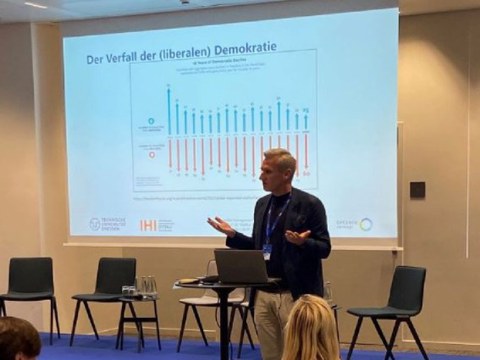Jul 07, 2025
Markus Scholz on the Political Responsibility of Business at the Responsible Management Summit 2025
On July 4, 2025, a broad range of stakeholders from business, academia, politics, and civil society gathered in Berlin for the Responsible Management Summit, hosted by the German Network for Business Ethics (DNWE). Under the title “New Challenges and Opportunities for Global Corporate Responsibility,” the summit addressed the shifting landscape of corporate responsibility in light of political expectations, regulatory pressure, and growing social polarization.
A central highlight was the keynote by Prof. Markus Scholz (TU Dresden) titled “Business Ethics in the Time of Monsters: Reflections on the Political Responsibility of Companies.” In his speech, Scholz painted a vivid picture of the current situation: in times of rising authoritarianism, companies must choose whether to remain silent on political matters—or to actively engage in defending open, democratic societies.
His analysis focused in part on recent developments in the United States. Scholz pointed to a growing trend among major corporations to retreat from public advocacy following Donald Trump’s return to power. All major U.S. banks, for instance, exited the Net Zero Banking Alliance even before the new administration began. Meta weakened its fact-checking rules, and McDonald’s quickly abandoned its DEI programs. These cases, Scholz argued, illustrate how corporate influence can be undermined by political pressure and co-optation.
The picture in Germany, he noted, is more complex. A recent study shows that 93% of publicly listed companies acknowledge a social responsibility beyond their core business objectives. However, ESG criteria still play only a minor role in shaping corporate strategy—well behind cost efficiency, customer satisfaction, and competitiveness. More troubling still: only 16.5% of surveyed executives view protecting liberal democracy as important, and just 12% express a willingness to engage against right-wing extremism.
According to Scholz, the threat posed by populist movements lies not primarily in their policies, but in the authoritarian techniques they employ once in power: restricting media freedom, weakening the rule of law, co-opting institutions, and discrediting opposition. For businesses, these dynamics undermine the very institutional foundations of a functioning market economy. That, he stressed, is reason enough for companies to take a stand.
His conclusion was clear: defending an open society is not just a moral imperative, but a strategic necessity for responsible business leadership. Now is the time for values-based positioning—and the courage to speak out.

